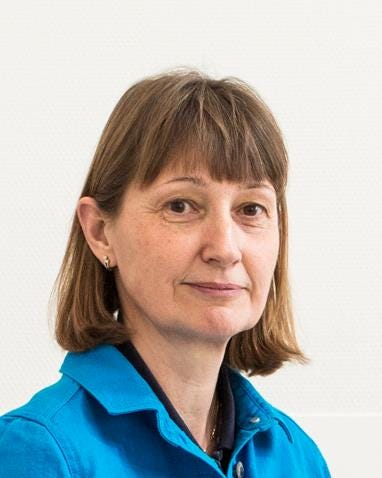Interview with Anne Visser-Meily
Interview with Anne Visser-Meily
Helping patients and caregivers uitklapper, klik om te openen

"Changing care takes a change of mind"
Rehabilitation physician Dr. Anne Visser found out that implementing something new takes as much perseverance and effort as it takes to develop an innovative tool itself.
Surviving stroke means an altered life to come, for patients as well as for their nearest and dearest. Some cope better with those changes than others. Sometimes the patient does adapt, but a partner gets stressed and depressed.
Professional care for caregivers should commence right after a cerebrovascular accident, says Visser. As head of the Centre of Excellence for Rehabilitation Medicine Utrecht*, she and her colleagues translate research into practicalities such as digital decision aids and an exercise app.
Book, exercise app and Activity Monitor uitklapper, klik om te openen
Making sure someone gets active right after a stroke is priority number one. “There's much evidence that patients stand better chances for recovery if they start physical exercises as soon as possible. Unfortunately, we can’t employ a personal trainer for every patient, so in 2010 we assembled a self-help book, funded by a government grant. Over 40.000 copies found their way to Dutch patients, mainly via patient associations. In 2013, the exercise guide was translated into English as well. The book was a start-up for what should be a longstanding exercise regime.
We have also developed an app, so new exercises and video instructions can be added regularly, and started with an Activity Monitor for cerebrovascular accident (CVA) patients to get insight into their exercise behavior and change the amount of physical activity in a responsible manner. We started with an exercise guide and now we also have an exercise app and Activity Monitor to promote exercise in CVA patients.”
decision aids uitklapper, klik om te openen
Priority number two: take the family on board. Anne recommends the Care Giver Strain Index: a 5-minute questionnaire telling if a caregiver is overburdened. Visser's PhD thesis in 2005 proved the importance of the private circle of caregivers around a patient. “We've been advocating care which actively involves the family ever since, but it takes much effort to deploy a change. We strive to get it embedded in all levels of education, into the mindset of the next generation, and have started the CARE4carer trial to develop and evaluate the effect of an eHealth program targeted at (personalized) psychoeducation and teaching of problem solving skills of the caregiver/partner during admission in a rehabilitation facility and after discharge.”
The expertise center also developed a downloadable decision aid to determine –on a multidisciplinary level– if a patient is ready to be discharged. “After this aid had proven its worth, we made a follow-up aid for stroke nurses. When patients are out of our sight, other things become important. What's their home situation? How's the patient's state of mind? Do caregivers cope? Our strong network of stroke nurses helped us tremendously; they tested our aid thoroughly and thus made it a better tool. This underlines my motto: from the start of any project, researchers should keep a clear clinical goal in mind.”
* Center of Excellence in Rehabilitation Medicine, Brain Center Rudolf Magnus, University Medical Center Utrecht, and De Hoogstraat Rehabilitation, Utrecht, the Netherlands

